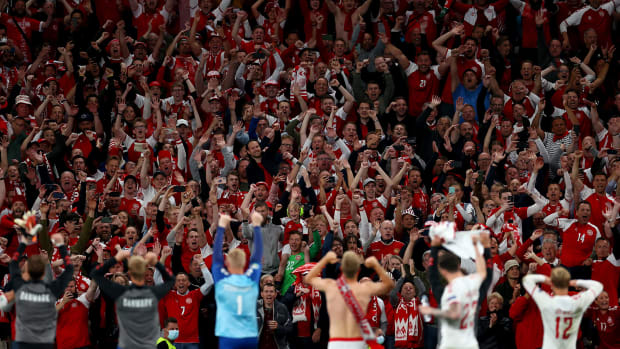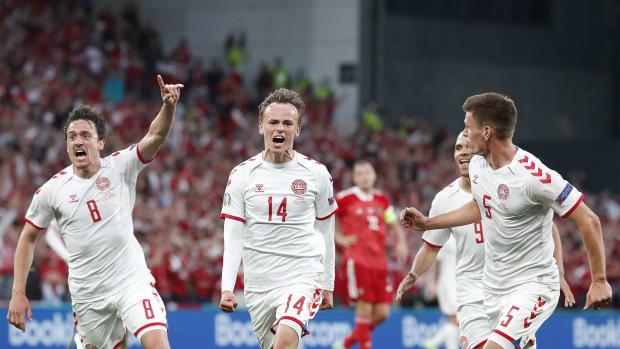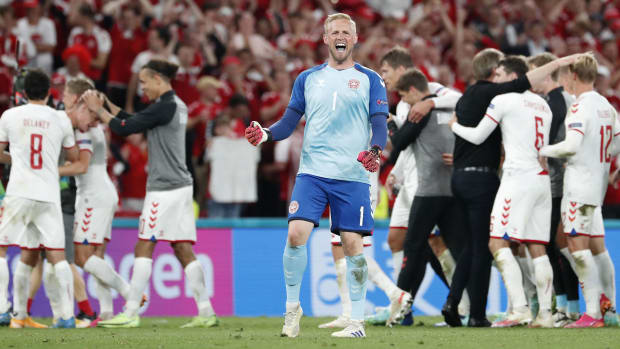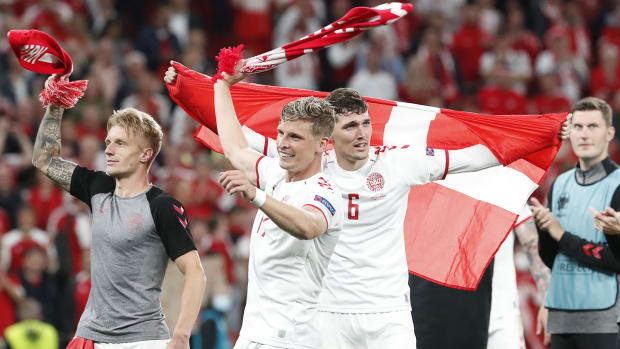What occurred in Denmark at the Euros on Monday encapsulated everything that The Beautiful Game is all about.
You don't have to be Danish to appreciate and understand the raw emotion that developed organically over the course of the last 10 days and cascaded through Parken Stadium Monday.
There's a special kind of feeling that happens when the moment hits. You recognize the moment, because it's involuntary. And when Denmark routed Russia as Belgium simultaneously handled a resolute Finland to confirm the Danes' place in the knockout stage of Euro 2020, that moment hit again and again.
Denmark goalkeeper Kasper Schmeichel went on to describe the events as "euphoria" and "a turbulent emotional roller coaster." After his teammate Christian Eriksen nearly lost his life after suffering cardiac arrest on the very same field just more than a week prior, it's hard to argue with his assessment.
Ever since Eriksen's episode and subsequent road to recovery, Denmark has become the center of the Euros. Its people and national team experienced the trauma of witnessing a very real near-death experience and ever since have rallied together with the support of the footballing world and beyond.
Even so, it entered the final match of group play in the competition with no points and small hopes of advancing. Defeat to Finland under brutal circumstances—having to resume play after a brief suspension following Eriksen's collapse—and then blowing a lead to Belgium in the following match as Eriksen recovered in a hospital a short drive away, left the Danes with no points and a -2 goal differential through two games.

Yet the buzz throughout Parken Stadium Monday as the concurrent events unfolded in the other match in St. Petersburg, Russia, was palpable around the globe, and it was here where two of UEFA's more head-scratching decisions regarding the Euros were vindicated.
The insistence on staging this tournament across the continent as initially planned, amid a pandemic, was certainly questionable given all we have come to know about virus transmission. A couple of host sites had to withdraw due to a lack of guarantees regarding fan attendance capabilities, and the varying protocols between countries and attendance caps haven't made this traveling circus the most fan-friendly event. Yet it's highly unlikely that Copenhagen would have been a host city without the pan-European approach. The Danish capital has become an honorary capital for the competition, even as the vast majority of it shifts elsewhere.
On top of that, the 24-team format is generally abysmal. Any format that has third-place finishers going through is ripe for critique, especially those where third-place finishers are at times hanging in the wind for days after they've completed group play, unclear whether their stay in the tournament is up or not. But in this one instance, it was a value-add, increasing the sense of drama. With a win, Denmark knew it had a chance. With a win and some help from Belgium, the team that joined the Danes in stopping a match for a minute's applause to honor Eriksen a few days before, Denmark knew it could go through instantly.

Denmark's small hopes grew with Mikkel Damsgaard's wonderful opening goal against the Russians and grew some more with Yussuf Poulsen's opportunistic second. Yet as Finland held out against a rotated Belgium team for which a draw would have sufficed, the Danes still needed more.
It appeared that "more" had come in the form of a go-ahead Romelu Lukaku strike, word of which audibly passed through the Parken Stadium stands, heightening the sense of theater. The subsequent VAR decision to rule that goal out made for a similar yet opposite response—all while moments later, Russia was awarded a penalty kick that cut into the Denmark lead and all-important goal-differential tally.
Belgium finally came through via an unlikely source. Thomas Vermaelen, whose final days at Ajax overlapped with Eriksen's time in the club's youth system, headed off the post, with the ball caroming off Finland goalkeeper Lukáš Hrádecký and in for the own goal that sent Denmark provisionally into second in the group.
As word of good news—this time, it stuck—again circulated Parken, Andreas Christensen capped a wild sequence with the only kind of strike that was beating Russia goalkeeper Matvei Safonov following a string of fantastic saves. An absolute thunderbolt ripped into the back of the net, and there it was. That "euphoria" that Schmeichel described.

A double dose of simultaneous good news followed with Lukaku's insurance goal for Belgium and another Denmark goal through Joakim Maehle—that involuntary, special moment hitting again and again for all lucky enough to witness everything as it unfolded. Maehle threw up a 1 and a 0 with his fingers, signifying whom all of this was for: No. 10, Christian Eriksen.
With Denmark's final whistle coming slightly before that in the other match, the players gathered around a coach's cellphone, refreshing the score to confirm what they'd been waiting to see, that their time in the competition would continue. That update came soon after and the shared joy between players and supporters that seemed so unlikely given the emotional trauma of days past was unleashed.
"Euphoria," once again.
To be sure, Denmark would have traded that magical span and accepted a lesser fate in this competition for the chance to undo the events of June 12. That is without question. But all anyone can do is accept circumstances and react to them. In Denmark's case, the reaction was sublime, unifying and cathartic, a reminder of what kind of impact this game and this sport can have when the fates align.
“We had hoped it would be a magical evening at Parken, and I would like to say a thousand thanks to all the Danes who have backed us unconditionally and given us support and love throughout,” said Denmark manager Kasper Hjulmand, who has been a figure of strength amid everything throughout the competition.
“I don’t think it could have been done if we hadn’t received that support. We can just feel it lifting the players. Thank you so much for all this support. It means so much to us.”

In a matter of 90 minutes—and really, in a matter of a few simultaneous instances—Denmark ascended from fourth to second, its place in the knockout stage confirmed without the need to watch the scoreboard in the days that followed. Its opponent in the last 16, Wales, is no pushover, but it's no superior side, either. In the FIFA world rankings, Denmark sits 10th, while Wales is situated in 17th. The knockout bracket is not yet fully set, but there's a sense that Denmark can do more in this tournament. And even if it does not, the events of Monday night and the emotions felt in Copenhagen that were broadcast to the world are enough.
"We’ve been through so much in the time we’ve been together. We all agreed that this was not the last chapter in this story," Denmark midfielder Christian Nørgaard said. "We must be allowed to enjoy the victory tonight and the feeling of moving on, after everything we have been through as a team. There was no doubt that this victory was also for Christian."
This is why we watch.
More Euro 2020 Coverage: